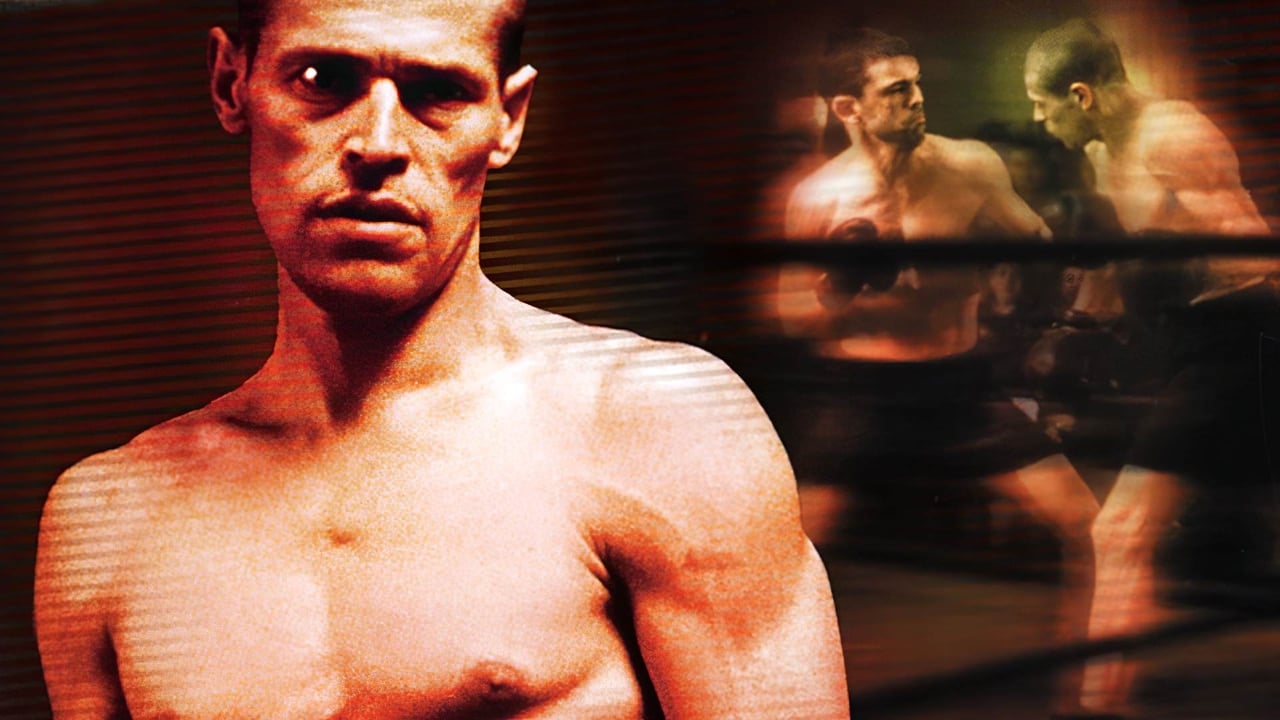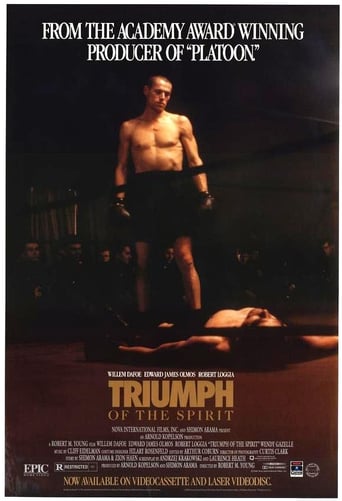

It's not great by any means, but it's a pretty good movie that didn't leave me filled with regret for investing time in it.
... View MoreWhile it doesn't offer any answers, it both thrills and makes you think.
... View MoreThere's a more than satisfactory amount of boom-boom in the movie's trim running time.
... View MoreI think this is a new genre that they're all sort of working their way through it and haven't got all the kinks worked out yet but it's a genre that works for me.
... View MoreThroughout history many have preferred to forget the atrocities of the Holocaust during World War II. However Hollywood has helped to keep this important event alive thanks to films like "Life is Beautiful", "Schindler's List" and "The Boy in the Striped Pajamas", but sometimes there are stories that go unrecognized or forgotten. Director Robert M. Young decided to take the lesser known story of Holocaust survivor Salamo Arouch and bring it to the masses.Salamo and his family (heritage of Jewish Greeks) are first seen living their lives happily just before the Nazis invade their village and ship the Jewish citizens off to concentration camps, specifically the dreaded Auschwitz. The film follows the Arouch family's struggle to struggle, specifically showing the male members of the family and also the perspectives of Allegra, Salamo's fiancée, and her sister on the women's side of Auschwitz. In the pivotal role of Salamo is an underrated performance by A-list star Willem Dafoe. Portraying a strong-willed survivor, but also a man who loses nearly every person he loves, the emotion of Dafoe's performance is raw and heartbreaking. Going from a carefree man with the world in the palm of his hand to a prisoner fighting (literally) to survive the harsh environment of Auschwitz. Dafoe's costar chemistry is in top form from a touchingly sweet affection for Wendy Gazelle as Allegra, a believable son to Robert Loggia who plays his father and a tenuous friendship with Edward James Olmos as Gypsy, the officer who aids Salamo by giving him a chance to use his boxing talents as well as a better (using the term loosely) job within the camp due to Salamo's consistent winning streak. Dafoe is an adept fighter, with a naturally thin frame and limber muscle, the actor demonstrates adept skill in the boxing arena. However as things grow from bad to worse for Salamo, Dafoe portrays the right amount of emotion that expresses the character's inner pain such as the horrible losses of his brother (shot for refusing to work in the crematorium) and father (executed in the gas chamber due to his age and no longer useful for labor to the officers of the camp), and fear at never seeing his beloved Allegra again. By the film's close we are as exhausted as Salamo and hope for a happy ending after so much horror.The film's narrative is quite dark and depressing due to the subject of the Holocaust and its atrocious violence. Prisoners were forced to march for hours on end, beaten if they tried to seek additional food or refusal to cooperate, many were shot and gassed if their usefulness had ended and there is the violence of the boxing ring when we watch our protagonist fight. It gets bloody and exhausting as we hope that things can't get worse for the characters, but knowing the history of what occurred during the Holocaust we know it is far from over until the Allied Powers finally liberated the camp in 1944.See this film as soon as you can, but keep some tissues on standby cause this is gonna make you cry.
... View MoreSomehow, in thinking of the horrors of the Holocaust, thoughts of Greece do not spring readily to mind. And yet, obviously there were Jews in Greece, and many were interned after the Nazis occupied Greece in 1941. "Triumph Of The Spirit" follows the story of Salamo Arouch, a Greek champion boxer who is among those sent to Auschwitz.Arouch's story is interesting. He uses boxing as a way of staying alive - fighting other prisoners for the entertainment of Nazi officers and officials, knowing full well that those he defeats are destined almost certainly for execution - and that the same fate awaited him if he were to lose. The movie is rife with reflection on collaboration. The Sonderkommandos (Jews who actively worked with the Nazis in exchange for privileges which included perhaps a few extra months of life) are front and centre in this, and we see various internees doing various things to placate the Nazis, to earn favour with them - and, in the circumstances, who can blame them. They were uprooted from often comfortable lives and placed almost literally into hell. Defiance might have been the more noble choice, but some form of collaboration was more practical. But the choice was never easy, and consciences were surely wounded as those decisions were made. Arouch was played by Willem Defoe - not my favourite actor, but he handled the part quite well. Some license was taken with his story, as is almost always the case when a story "based on fact" is portrayed, but basically from what I've been able to learn the broad sweep of Arouch's story is told. Really, though, Arouch fades into the background in this - or, at least, he did for me.It was the sheer brutality of Auschwitz and of Nazism that was the engine driving this movie forward. It's a realistic and gripping portrayal of the conditions in the camp - all under the slogan "Arbeit Macht Frei" - "work makes free" - the slogan that appeared over the gates entering Auschwitz. It makes what happened inside the camp sound almost noble, but there was nothing noble about the type of work done in Auschwitz, and it had nothing to do with freedom. That was made very clear throughout this film. It was, perhaps, the closest thing to hell that any of the inmates could have possibly imagined. Many died, and those who survived were scarred for life, left empty by the experience. The last scene, I thought, portrayed this quite hauntingly, as Arouch - who survived - wanders lost and aimless away from the camp after liberation, not knowing where he was going or what he would find. His story has a "happy" ending filled with marriage and children and grandchildren, but how happy could it have really been, all things considered.This isn't the best movie about the Holocaust ever made, but it is one that stays with the viewer, and it's one that provides a gripping portrayal of life inside perhaps the most notorious of the Nazi concentration camps. (8/10)
... View MoreThis is an exceptional tale of an extremely talented and gifted sportsman surviving an immoral, insane, racist, despotic ideology through the one thing he knows best, boxing. It's an ode to a man refusing to accept the obvious fate and fighting to stay alive in spite of the total degeneration and breakdown of all humanity around him. In a way I compare this movie to 'The Pianist' and unlike many other holocaust movies, this movie depicts the protagonist fighting back his tormentors and even bettering them as they hate him for winning every time. All this time he is like a Gladiator, fighting other men who are in same position as his, just to entertain ruthless Nazi officials while he is constantly aware that if he loose he would surely die. The movie is aptly named after Salamo's undying perseverance for life where his soul was been trampled. The death camp scenes sure hint that movies like Schindler's list and life is beautiful borrow heavily in visual style from this movie. Though the violence in the movie is more of suggestive and less graphic than its successors yet it proves quite moving due to a very convincing performance of William Dafoe (I am sure he did work hard to get in shape and develop such agility for a boxer), and to the fact that all this happened in reality. Also the soundtrack was successful in carrying the heaviness of the movie. Sure it is a seriously made movie on one of the most shameful happenings of modern human history. But at one point it can also be seen as a great boxing movie. It is like capturing the psychology of a tormented and tortured warrior, and the movie does that well.
... View MoreThe events depicted in the movie are well documented in historical accounts of the concentration camp experience, and according to these accounts they are not overstated in this film. Director Robert M. Young's background in making documentaries makes this docu-drama all that much more devastating. This is the holocaust, without frills, humor, or preaching. It is what it is. I wonder about other comments criticizing the film because it is too depressing. Gee, sorry if the holocaust ruined your evening. If you don't think you can take the raw experience, don't watch the film. Of course it is depressing, more than that. However, having watched it, I can say I can better understand and appreciate the creation of the state of Israel after the war. Mr. Young did an excellent job of film making on an extremely sensitive topic. Incidentally, he was co-writer on one of my all time favorite films, a 1964 low budget black and white gem, "Nothing But a Man." Also a sleeper which received extensive critical praise but not much exposure, I believe it to be hands down the best film depicting the black experience in America, particularly southern blacks in early 1960's at the apex of the civil rights movement. See my review on this site. Don't miss it.
... View More